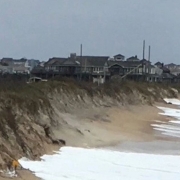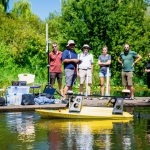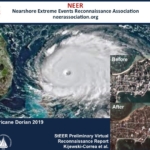DUNEX
NEER members may coordinate with academic and agency researchers and local managers participating in the During Nearshore Extreme Event Experiment (uscoastalresearch.org/dunex) being conducted in 2019 and 2020.
DUNEX is a multi-agency, academic, and non-governmental organization collaborative community experiment to study nearshore coastal processes during coastal storms. The multi-phase experiment begins with a pilot study in fall 2019, followed by the full experiment starting in fall 2020 and extending into winter 2021. The northern Outer Banks, North Carolina, extending from the Cape Hatteras National Seashore north to the Virginia border, was selected as the region of focus, due to the prevalence of coastal storms that impact the area annually, such as the passage of Hurricane Dorian early this month. The study provides an opportunity for research groups to observe and analyze interactions between ocean, land, atmospheric, and biological processes during nearshore events.
Agencies, organizations, and universities participating in the pilot study include the U.S. Army Corps of Engineers, U.S. Geological Survey, Woods Hole Oceanographic Institution, North Carolina State University, East Carolina University, Virginia Polytechnic Institute and State University, Virginia Commonwealth University, Oregon State University, the U.S. Naval Research Laboratory, the U.S. Naval Academy, the University of Southern Mississippi, George Mason University, Northeastern University, North Carolina Coastal Federation, the University of Washington, the University of Delaware, Queen’s University, the U.S. Fish and Wildlife Service, the National Park Service, the National Science Foundation and the University of Florida.




 photo by Joe Wartman
photo by Joe Wartman